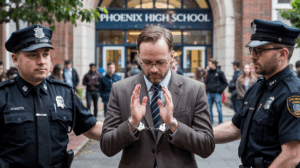LISTEN TO OUR SCHOOL-RELATED SEX CRIMES LEGAL PODCAST
If a teacher in Arizona faces criminal charges for school-related sex crimes, authorities act quickly under strict laws to protect victims and guarantee justice. Schools must report suspected abuse immediately, triggering coordinated investigations involving law enforcement and Child Protective Services. Evidence is carefully preserved, leading to arraignment, possible bail, and the issuance of protective orders.
Both prosecution and defense prepare through discovery, with trials often involving expert testimony and specific jury instructions.
Suzuki Law Offices can provide essential guidance throughout this process. For legal assistance, visit a Phoenix Criminal Defense Lawyer.
Committed to providing exceptional legal service to each and every client through integrity, compassion and experience.
Get StartedWhat Happened? Cortez High School Teacher in Phoenix was Arrested
-
Eric Curtis Chapman, a 43‑year‑old teacher and coach at Cortez High School in Phoenix, was arrested on April 16, 2025, on multiple counts of sexual conduct with a minor and sexual exploitation of a minor; a judge set his bond at $250,000 cash‑only given his position of trust.
-
According to court documents, Chapman believed he was interacting with a minor via social media and sent inappropriate images; he later admitted to filming sexual acts with two current male students (one as young as 16) and one former student in campus classrooms, the locker room, and his personal vehicle.
-
Investigators recovered over 100 files of alleged child‑sexual‑abuse material from Chapman’s phone and computer during their search.
-
The Glendale Union High School District immediately relieved Chapman of all duties upon notification by Phoenix Police and emphasized its full cooperation with law enforcement; parents and students have expressed shock and concern over the breach of trust and campus safety.
Case Study: Phoenix High School Teacher Arrest Illustrates the School‑Related Sex Crime Process
Although such cases are distressing, examining the recent arrest of a Phoenix High School teacher provides valuable insight into how school-related sex crime investigations unfold. When you learn about Arizona teacher mandatory reporting requirements, you understand that staff must promptly report any suspected abuse to authorities. This triggers coordinated efforts between school officials and law enforcement, ensuring evidence is preserved and investigations proceed efficiently. Once the teacher was arrested, the arraignment process involved setting bail and issuing protective orders designed to safeguard the alleged victim and the school community. These protective orders restrict contact and access, preventing further harm during legal proceedings.
By analyzing this case, you can see how Arizona’s system emphasizes swift action and collaboration, striking a balance between legal protocols and student safety. Understanding these steps helps you appreciate the intricacy and seriousness of addressing sex crimes in educational settings while fostering a supportive environment for all parties involved.
Click to contact our personal injury lawyers today
Understanding Arizona’s School‑Related Sex Crimes Statutes
The arrest and legal proceedings involving the Phoenix High School teacher highlight the importance of understanding the specific statutes that govern school-related sex crimes in Arizona. Arizona school-related sex crime statutes define offenses involving educators and students, emphasizing protection within educational settings. You should recognize how these laws influence county attorney charging decisions for Arizona sex offenses, which vary based on the strength of the evidence and the context. Understanding these statutes enables you to identify potential defense strategies for teachers accused of school-related sex offenses, including challenging the intent or identifying procedural errors.
Key points to understand include:
- Scope of offenses: Covers acts between teachers and students or school employees.
- County attorney discretion: Prosecutors evaluate evidence before pressing charges.
- Defense approaches: Can involve contesting evidence, intent, or jurisdictional issues.
Complete a Free Case Evaluation form now
Mandatory Reporting Obligations for Arizona Educators
You’re required by Arizona law to report any suspected child abuse or neglect immediately. Failure to comply can lead to serious legal consequences, including criminal charges and professional penalties. Understanding these obligations helps you protect students and avoid liability.
Reporting Requirements Overview
Since educators in Arizona play an essential role in safeguarding student welfare, you’re legally required to report any suspected child abuse or neglect. Your prompt action initiates child protective services involvement in Arizona school cases, which is critical for protecting students and ensuring thorough investigations. Accurate and timely reporting also supports evidence discovery for Arizona school sex crime defense, helping to clarify facts during legal proceedings. To fulfill your obligations effectively, remember to:
- Report suspicions immediately to designated authorities.
- Document observations clearly and factually.
- Cooperate with investigators and understand jury instructions and expert testimony in Arizona sex crime trials.
Legal Consequences for Noncompliance
Although reporting suspected child abuse is a vital legal obligation for Arizona educators, failing to comply can lead to serious criminal charges. If you don’t report suspected abuse promptly, you risk misdemeanor or felony charges, depending on the circumstances. The legal consequences extend beyond criminal penalties; a failure to report can severely impact your teaching license. For educators convicted of sex crimes, the post-conviction career and licensure impact is significant; revocation or suspension of your teaching credentials is common.
This can effectively end your career in education in Arizona. Understanding these obligations helps protect you and the students you serve. Staying informed and compliant is crucial for maintaining your professional standing and avoiding the severe repercussions associated with noncompliance in mandatory reporting laws.
How School and Law Enforcement Agencies Coordinate Investigations
When a report is made, schools typically follow strict protocols to notify law enforcement promptly. Both agencies then work together through joint investigation procedures to guarantee that evidence is collected accurately and efficiently. Clear communication between school officials and officers is essential to maintain the integrity of the investigation and protect all parties involved.
Reporting Protocols
While school administrators handle initial reports of misconduct, law enforcement agencies take charge once criminal activity is suspected. You’ll find that clear reporting protocols ensure smooth coordination between schools and police.
When a report arises, schools must promptly:
- Notify law enforcement within 24 hours to comply with Arizona’s mandatory reporting laws.
- Preserve all evidence and maintain confidentiality to protect all parties involved.
- Provide detailed documentation, including witness statements and timelines, to support investigations.
Joint Investigation Procedures
Effective coordination between school officials and law enforcement agencies guarantees investigations proceed efficiently after initial reports are made. You’ll see that joint investigation procedures in Arizona typically involve immediate notification of law enforcement once a report arises. School administrators preserve evidence and limit internal actions to avoid compromising law enforcement’s work. Both parties assign clear roles—law enforcement handles criminal inquiries, while the school focuses on student safety. You’ll notice that Arizona law encourages collaborative meetings to align investigative steps and timelines, minimizing duplication. Data shows that schools adhering to these joint procedures experience faster case resolutions and improved protection for all involved. By understanding and engaging in these structured collaborations, you become part of a system designed to uphold justice and maintain a safe educational environment.
Communication Between Agencies
Because clear communication forms the backbone of successful investigations, school and law enforcement agencies in Arizona use established protocols to share information promptly and accurately.
When you’re involved in these processes, you’ll notice that agencies coordinate by:
- Exchanging case details through secure channels to maintain confidentiality and integrity.
- Scheduling joint meetings to align investigative steps and ensure no evidence is overlooked.
- Designating liaison officers who facilitate smooth communication and quick response times.
This structured collaboration helps you trust that all parties work efficiently toward justice. It minimizes delays and prevents miscommunication, which is vital in sensitive cases involving teachers facing criminal charges. By following these coordinated practices, you become part of a network committed to protecting students and upholding community safety.
The Role of Phoenix Child Protective Services in School‑Related Cases
Although schools play a crucial role in identifying potential abuse or neglect, Phoenix Child Protective Services (CPS) takes the lead in investigating and intervening in these cases. When a report involves a teacher, CPS coordinates with school officials to guarantee child safety while maintaining confidentiality. You can expect CPS to conduct thorough interviews and assessments to determine if abuse occurred, focusing on the child’s welfare above all. Their investigations often involve multidisciplinary teams, including law enforcement and medical professionals, to gather evidence and provide support services. CPS also works to connect affected families with counseling and protective resources, aiming to stabilize the child’s environment.
By law, CPS must act promptly, striking a balance between the urgency of protection and the due process of law. Understanding CPS’s role helps you appreciate how the system prioritizes child safety while collaborating with schools and other agencies to address allegations against educators in an effective and responsible manner.
From Investigation to Indictment: The County Attorney’s Charging Decision
Once CPS completes its investigation and gathers evidence, the case moves to the county attorney’s office for review. Here, the county attorney determines whether there is sufficient credible evidence to file criminal charges against the teacher.
You should understand that this decision hinges on several critical factors:
- Evidence strength: The attorney assesses whether the collected evidence meets the legal standard for probable cause.
- Victim’s cooperation: The alleged victim’s willingness to participate can significantly influence the case’s viability.
- Legal thresholds: The attorney considers whether the alleged conduct violates specific Arizona statutes related to school‑related sex crimes.
You’ll find that the county attorney’s role is pivotal—they balance the protection of the community and ensuring fair treatment of the accused. The charging decision isn’t automatic; it reflects careful analysis of facts, legal standards, and public interest. By understanding this process, you gain insight into how justice navigates the complexities of school-related allegations.
Pretrial Procedures: Arraignment, Bail, and Protective Orders in Arizona
After the county attorney files charges, the case proceeds to pretrial procedures, which include arraignment, bail hearings, and potential protective orders. At arraignment, you’ll hear the formal charges and enter a plea. This step assures you understand the accusations and your rights. During bail hearings, the court assesses flight risk and community safety to determine if you can remain free before trial. Factors include the severity of charges, criminal history, and ties to the community.
Bail may be set, denied, or released on recognizance. Protective orders are often issued to accompany these hearings, safeguarding alleged victims or witnesses. These orders can restrict your contact with specific individuals or locations, such as schools. Understanding this process helps you steer through the system responsibly and prepare for subsequent stages. Engaging a knowledgeable attorney early on can clarify these steps and advocate effectively for your rights throughout pretrial proceedings.
Discovery and Evidence: What Phoenix Teachers and Defendants Need to Know
While navigating criminal charges, understanding discovery and evidence is crucial for both teachers and defendants. Discovery ensures that you have access to all relevant information the prosecution holds, which can shape your defense strategy. You’ll want to know precisely what evidence is being used against you and have the opportunity to challenge its validity.
Key points to focus on include:
- Types of Evidence: Physical items, digital communications, and witness statements are common in school-related cases.
- Disclosure Deadlines: Prosecutors must share evidence within specific timeframes, allowing you time to review and respond.
- Your Rights: You have the right to request additional evidence and challenge any improper or illegally obtained materials.
Trial Dynamics: Jury Instructions and Expert Testimony in Phoenix
Although trial dynamics can vary widely, understanding jury instructions and expert testimony is vital for teachers facing criminal charges. Jury instructions guide jurors on the legal standards they must apply, such as defining the elements of the alleged offense and the burden of proof. These instructions guarantee that jurors evaluate evidence consistently and fairly, which directly impacts the trial’s outcome. Expert testimony often plays a central role in interpreting intricate evidence, such as psychological evaluations or forensic analyses. Experts provide objective insights that jurors might not grasp otherwise, helping clarify facts related to behavior patterns or credibility assessments.
As a teacher in this situation, you benefit from knowing how these components work together. Clear jury instructions combined with credible expert testimony create a framework for a reasoned verdict. Familiarizing yourself with these trial elements fosters confidence and a sense of belonging in navigating Arizona’s legal process for school-related sex crimes.
Common Defense Strategies in Phoenix School‑Related Sex Crime Cases
When defending against school-related sex crime allegations, attorneys often focus on disproving intent or challenging the credibility of evidence. You’ll find that defense strategies typically revolve around scrutinizing the prosecution’s claims and highlighting inconsistencies. These tactics aim to create reasonable doubt and protect the accused’s rights throughout the process.
Common approaches include:
- Questioning witness reliability: Examining inconsistencies in testimonies or potential biases that may affect accuracy.
- Challenging physical or digital evidence: Analyzing the collection, handling, and interpretation of evidence to detect errors or contamination.
- Demonstrating lack of intent or consent: Presenting alternative explanations or context that negate criminal intent or establish consent.
Post‑Conviction Consequences: Sentencing, Licensure, and Career Impact in Phoenix
Because criminal convictions carry severe repercussions, you should understand how sentencing, licensure revocation, and career impact typically unfold after a sentence in school-related sex crime cases. Sentencing often includes prison time, probation, and mandatory registration as a sex offender, reflecting the seriousness of these offenses. Arizona law requires the immediate suspension or permanent revocation of your teaching license upon conviction, effectively barring you from future employment in public schools. This loss of licensure ends your ability to work as a certified educator statewide. Beyond formal penalties, your career faces significant barriers: private schools may also reject hiring, and your professional reputation suffers long-term damage.
Many convicted teachers struggle to secure alternative employment in education or related fields. Understanding these consequences can help you steer through the post-conviction landscape and seek appropriate legal or rehabilitative support. You’re part of a community that values accountability but also recognizes the importance of clear information and support during challenging times.
When facing school-related sex crime charges in Arizona, you must understand the legal framework, reporting duties, and investigative coordination involved. The process relies heavily on evidence collection, expert testimony, and specific jury instructions. Defense strategies vary, but post-conviction consequences often include sentencing, loss of licensure, and career impact. Staying informed about each stage can help you steer these serious allegations with clarity and preparedness.
Call or text 602-682-5270 or complete a Free Case Evaluation form




